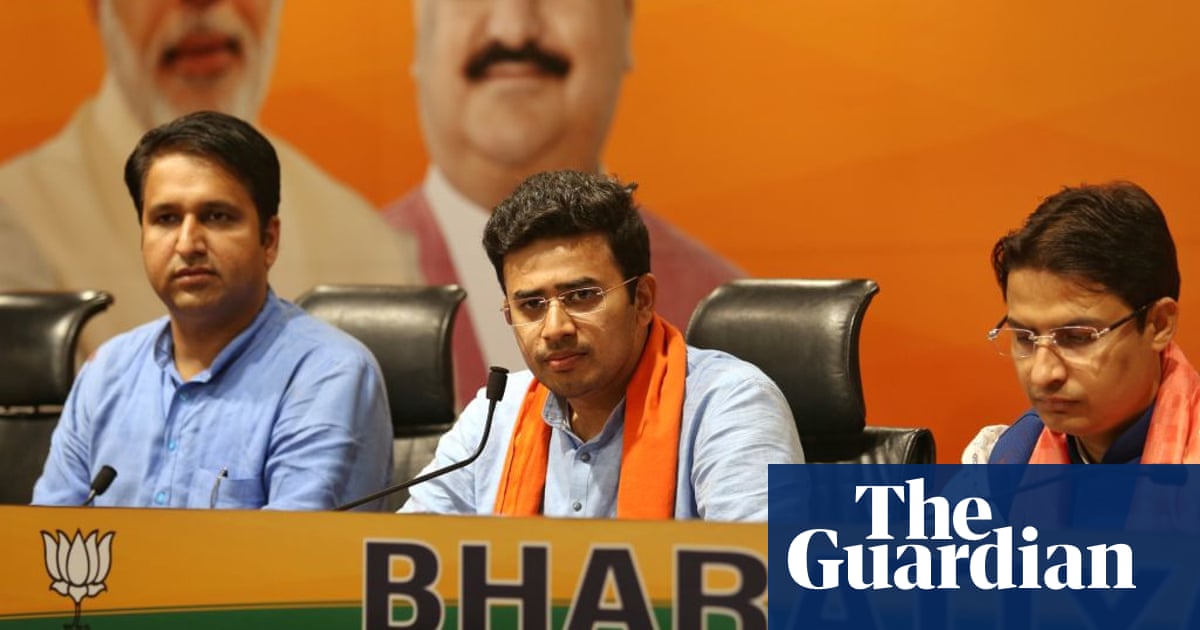
An Indian politician visiting Australia called the Muslim conquest of India “the bloodiest chapter in the history of the world” and appeared to equate it with the Holocaust amid a controversial speaking tour.
Bharatiya Janata party (BJP) MP Tejasvi Surya, in Australia to take part in a series of events, including the Australia India Youth Dialogue (AIYD), told an audience in Parramatta on Monday that the history of Islam is “writ large with bloodshed and violence.”
“I want to put one specific thought in all of your minds, we know the history of this particular community from the time of its existence, and its history has been writ large with bloodshed and violence.”
A video of his comments surfaced on Twitter, where he also encouraged attendees to support an initiative calling for a ban on halal food, adding that the Hindu community must vote for parties that “exclusively protect Hindus”.
The comments came at a private event organised after a public “interaction with students” was supposed to be held at the ECA College in Parramatta, in the same building as the Swinburne University of Technology.
That event was cancelled, after the Swinburne Islamic Society sent a letter demanding the university intervene.
The ECA College did not respond to a request for comment. A spokesperson for Swinburne denied any involvement in the event’s cancellation, noting only that the event was due to be held in the same building as the university.
Surya will also be taking part in AIYD, which is being held until 4 June, and includes events in both Sydney and Melbourne. The events involve young delegates from India and Australia engaging in discussions to strengthen ties between the two nations.
A representative of the AIYD told the Guardian the organisation does not endorse any views of their delegates.
“We understand the concerns that have been expressed but AIYD does not endorse the views of any individual delegate. That’s what makes the dialogue such a valuable cultural exchange and has done since it began in 2012.
“There are deep complexities in the range of views held by people in both countries. Recognising that these deep complexities exist will help Australia and India understand one another better. That doesn’t imply support for any particular view. The AIYD is staunchly apolitical.”
Surya’s comments come as Muslim student associations, religious groups, advocacy groups and academics from across the country protest his arrival in Australia.
Junaid Ahmed, from the University of New South Wales, and a representative of the coalition of 25 Muslim Student associations from around Australia protesting Surya’s visit, told the Guardian that platforming Surya at various universities “normalises” his views. He also considers that the comments constituted hate speech and promoted Islamophobia.
“As a student body, and representatives of Muslim students on campus, we believe that allowing Surya to speak at our universities is a step toward encouraging and allowing hate speech and Islamophobia.
“Such hate speech promotes Islamophobia and facilitates violent extremism. Discrimination and hate speech should not be accepted at our universities or in our wider Australian societies.”
Surya, who is a member of the Rashtriya Swayamsevak Sangh (RSS), a far-right Hindutva organisation, has a history of strong statements regarding the connection between Islam and terrorism.
He tweeted in 2015 that “terror has no religion. But the terrorist definitely has a religion and in most cases it is Islam.”
Surya is due to speak at an event in Melbourne on Saturday, and the Australian Alliance Against Hate (AAAH) says a protest will be held outside the venue to protest his views.
In a statement, the AAH says it is organising the protest to “raise awareness of escalating Hindutva hate speech, social discord and widespread community fears for their safety and security”.
Shanti Raman, spokesperson for Hindus For Human Rights, said it was important that different faith groups come together to oppose figures like Surya.
Over 5,600 people have signed a petition calling for Surya’s visa to be revoked, as well as calling for universities including Monash University and Macquarie University to revoke their partnership of AIYD.
A spokesperson for Monash said the university was “not involved in the selection of delegates attending the 2022 event”, while a Macquarie University spokesperson said its “partnership does not imply endorsement of the views of any delegate participating in an AIYD event”.
A spokesperson for the University of Sydney, another partner of AIYD, says it accepts that “AIYD does not endorse particular political views, but rather seeks to provide a platform for the diverse and complex range of views that exist in both India and Australia”.
“As an elected member of Indian parliament, we consider the participation of this delegate reflects this aim based on our current understanding.”
The Islamic Council of Victoria has echoed calls for AIYD to rethink their platforming of Surya, urging the dialogue to do “the responsible thing and withdraw its invitation to Tejasvi Surya”.
“The ICV does not believe that providing such a hateful figure with a prominent platform is consistent with the AIYD’s aim of nurturing a diverse and equitable dialogue.”
Tejasvi Surya has been approached for comment.







